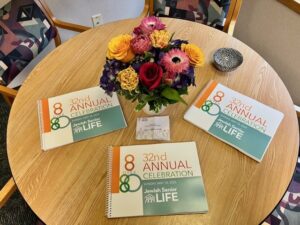11 Signs It Might Be Time For Assisted Living
For many, a discussion about transitioning a loved one to an assisted living facility is not a desirable one. As much as we often loathe the prospect of aging, we can’t escape the inevitable – and neither can those we love.
How to know when it’s time for assisted living, whether for ourselves or a loved one? Below are 11 signs to look for that may warrant a discussion about choosing an assisted living senior community together. For any new, unusual, or concerning behaviors please always be sure to seek proper medical advice.
1) Poor Hygiene
Have the grooming habits of your loved one changed? Did they look unkempt the last time you visited? For someone with early onset dementia, or who just doesn’t feel great, one of the first things to go can be personal hygiene. They may have difficulty bathing, or not do it as often or thoroughly as they should. When it becomes noticeable that someone is no longer able to care for their own basic needs, it may be time to consider a move to an assisted living facility.
2) Unable To Handle Daily Activities
Think about the last time you visited your loved one’s home. Was the house clean? Were there unpaid bills on the table? Was there food in the fridge? Was it spoiled? Sometimes, even simple tasks can become overwhelming. If a family member or loved one is struggling with housework or other daily activities, it may be time for a change.
3) Poor Eating Habits
Nutrition influences our overall well-being, especially as we age. If your loved one is unable to cook, their eating habits may decline. It’s important to get the proper nutrients, vitamins, and minerals to sustain good mental and physical health. If you’re witnessing poor eating habits that are of concern, consider a community with a robust dining program to help keep your loved one healthy.
4) Improper Medication Consumption
Everyone forgets to take their medicine occasionally. However, if your loved one is doing this often, it could become a serious problem. For most, prescribed medicine is vital to keeping one’s health conditions under control. While there are some at-home systems to help them try to remember, this could definitely be a sign it’s time for additional help.
5) Wandering Off
If you worry about the mental awareness of your loved one, and they live alone, there is a good chance you have a fear of them wandering off. They might think they know where they are going, but just get lost. Or they just want to get out of the house and inadvertently lose their bearings. This is a valid fear, and if it has happened or you believe it may, it’s a good time to begin discussing other options.
6) Chronic Health Issues
Chronic health issues are diseases or conditions that usually last for 3 months or longer and may get worse over time. These tend to occur in older adults, and can usually be controlled but not cured. Health issues like these may weaken the immune system, causing your loved one to fall ill more often and possibly stay sick for longer. If you’re finding your loved one needs 24-hour care, it may be time to tour our Assisted Living facilities to learn more about our 24-hour oversight.
7) Becoming Aggressive
Unfortunately, aggression is a common behavioral symptom of dementia. This is a devastating effect of dementia, and especially hard on caregivers. If this is a new behavior or personality change, it may be time to seek assistance. Our communities are safe places to live, with skilled, highly trained staff who know how to deal with these situations.
8) Recent Falls
Have falls become a frequent occurrence? Mobility issues are common in seniors, and homes contain many areas that can cause a fall. Assisted living facilities are designed with the older adult in mind. Our JSL staff has thought through safety measures to prevent falls and will assist and advise residents on how to make their living spaces – safe places.
9) Isolation and Sadness
As seniors experience mobility issues, or find it difficult to drive, they will naturally venture out less. The result of this can be isolation and loneliness. Social isolation and loneliness have been linked to higher risks for a variety of physical and mental conditions. If your loved one is displaying symptoms of depression or expressing feelings of loneliness, it might be the right time for transitioning to assisted living. Our assisted living facilities are more than residences – they’re communities of friends and neighbors. Common areas have been designed for social interaction, and activities bring people together.
10) Caregiver Stress
When a person decides to care for their family member or loved one, they do so with the greatest love. However, this caretaking is a difficult challenge both emotionally and physically. If you’ve reached the point of caregiver burnout, it’s ok to ask for help. Schedule a tour today and we can work together to find the right solution for you and your loved one.
11) Sundowning
The term “sundowning” refers to a state of confusion that occurs in the late afternoon and lasts into the night. Also known as “late-day confusion”, it can cause behaviors such as confusion, anxiety, aggression, pacing, or wandering. When an individual with dementia has used up all their energy for the day, they may become agitated toward the end of it. If evenings are becoming particularly stressful, you may become concerned your loved one’s quality of life isn’t as high as it should be. We suggest touring our assisted living community to see how we can be an option for your family.
When Is It Time For Assisted Living?
Only you can make that final decision, however if you’re noticing any of these signs and symptoms in a loved one, please feel free to contact us.
Making a move to Assisted Living can be a difficult discussion. Here at Jewish Senior Life, we are a community. We offer two Assisted Living communities in Oakland County, one in West Bloomfield and the other in Oak Park.
As an adult child, you can feel assured that your loved one is cared for here at JSLMI. If you or a loved one are ready for the transition to assisted living, or you just need to learn more, we’re here to support you. Schedule a tour with us so we can work together to find the right solution for your loved one.









